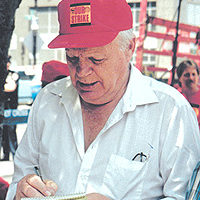The United Steelworkers of America (USWA) and the International Labor Rights Fund (ILRF) have filed a federal lawsuit charging the U. S.-owned Drummond Company with complicity in the assassinations of Valmore Lacareno, Victor Orcasita and Gustavo Solar, leaders of the union representing workers at Drummond’s coal mining operations in Colombia. Lacareno and Orcasita were dragged off a company bus and shot by paramilitaries in March 2001. Solar suffered the same fate in October.
Leo Girard, USWA president, said the union’s decision to join the suit stems from the union’s unyielding “commitment to the fundamental rights of workers in every nation.” A USWA delegation was visiting Colombia at the time Lacareno and Orcasita were murdered.
“We have evidence that the paramilitaries who killed the three union leaders were in fact working for Drummond,” said Terry Collingsworth, president of the ILRF.
The suit charges that Drummond “hired, contracted with or otherwise directed” paramilitary security forces that utilized extreme violence and “murdered, tortured, unlawfully detained or otherwise silenced trade union leaders” and, further, the murders occurred to prevent their participation in negotiations.
The complaint says Lacareno and Orcasita knew of death threats against them and asked Drummond officials if they could stay in the plant overnight for their safety. The request was denied without explanation, the company saying only they “hoped the authorities take measures they consider appropriate regarding the situations raised by you all.”
The refusal came despite warnings from Colombia’s secret service agency (DAS) alerting Drummond that both men were at high risk of assassination and echoing their request to sleep at the mine.
The lawsuit says several paramilitary gunmen stopped a Drummond bus carrying miners back to their villages and ordered Lacareno and Orcasita off. “Several witnesses heard the paramilitaries say that they were there to settle a dispute that Lacareno and Orcasita had with Drummond,” the lawsuit said.
The complaint says any effort by the plaintiffs to seek legal redress “would be futile” because those seeking to challenge official or paramilitary violence, including prosecutors and prominent human rights activists, are at great risk from retaliation. “Indeed, not one perpetrator has been successfully prosecuted for any of the thousands of cases of trade union assassination which have taken place since 1986,” the plaintiffs say.
In their complaint the plaintiffs charge that Drummond’s actions violate laws, agreements, conventions, resolutions and treaties that include: the United Nations Charter and Universal Declaration of Human Rights, the International Covenant on Civil and Political Rights, International Labor Organization Conventions 87 and 98, which protect the fundamental rights to associate and organize, and Article 3 of the Geneva Conventions.
Court documents point to the fact that investigators from Human Rights Watch found “detailed, abundant, and compelling evidence of continuing close ties between the Colombian Army and paramilitary groups responsible for gross human rights violations.” U.S. State Department’s 2001 Country Reports on Human Rights Practices – Colombia,” confirms this fact without reservation.
In addition, international organizations, including Amnesty International, the International Labor Organization, and the United Nations Commission on Human Rights have all reported extensively on paramilitary violence against trade union leaders in Colombia.
The lawsuit says the extent of the Colombian conflict “is so pervasive” that the country’s civil war must be governed by the rules of war so that the combatants, including the right-wing paramilitaries and the regular military, are governed by Article 3 of the Geneva Convention, which applies to “an armed conflict not of an international character.”
Thus, the complaint says, “noncombatants are protected from human rights violations and other war crimes committed by any parties to the conflict, which includes the paramilitary forces that clearly are major participants in the conflict.”
Since the CUT, Colombia’s largest union federation, was founded in 1986, some 3,800 trade unionists have been assassinated. The homeless and prostitutes are also targeted for murder by the paramilitaries. The murders are called “social cleansing” by the right wing.
The Colombian paramilitaries were created under “Law 48,” which authorized the Defense Ministry to create and provide weapons to civil patrols. Seventy-eight percent of the murders of Colombian trade unionists between October 1999 and March 2000 were attributable to the paramilitaries.
Although Drummond flatly refused to improve security arrangements for the union leaders, it made sure that the expatriate employees from the U.S. were never exposed to danger by flying them out of the area to their highly secure residential facilities.









Comments